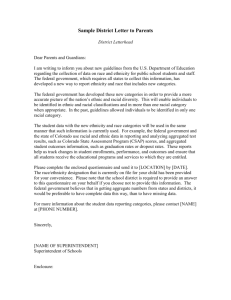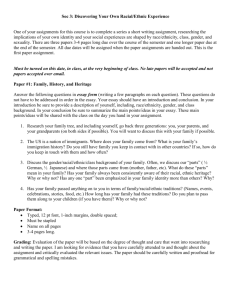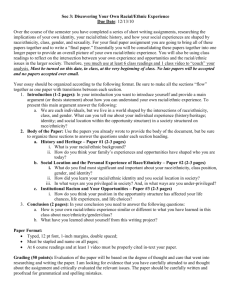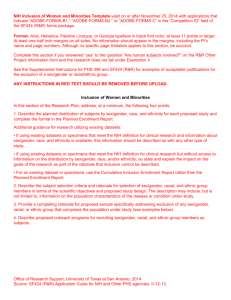PS 231 Politics in Multi
advertisement
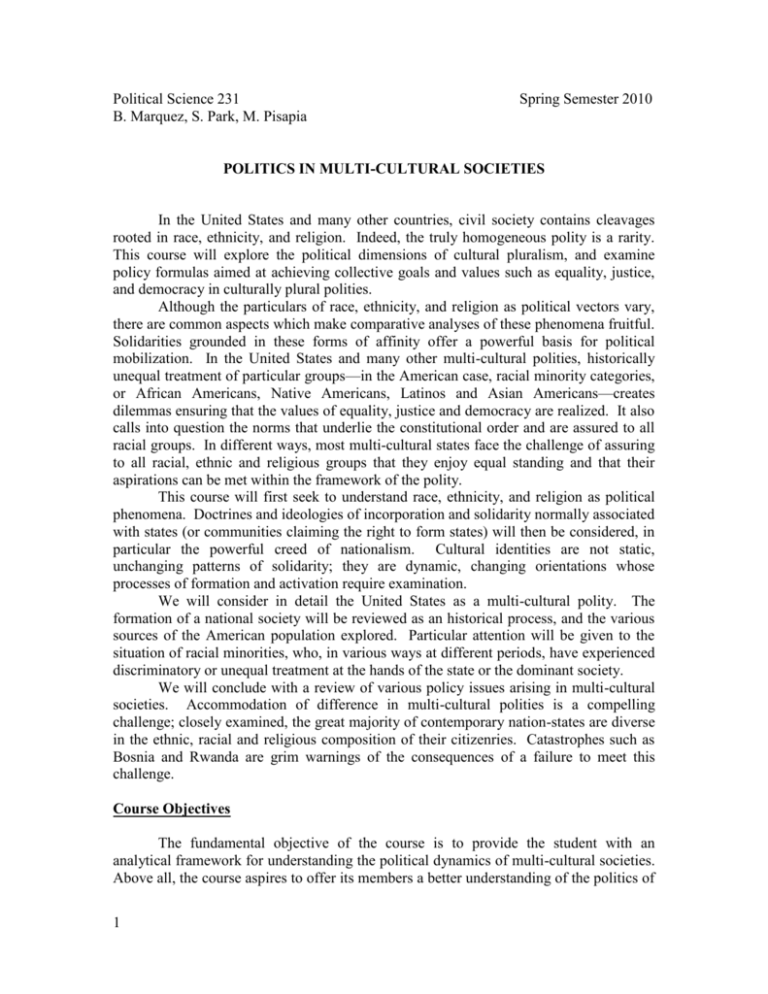
Political Science 231 B. Marquez, S. Park, M. Pisapia Spring Semester 2010 POLITICS IN MULTI-CULTURAL SOCIETIES In the United States and many other countries, civil society contains cleavages rooted in race, ethnicity, and religion. Indeed, the truly homogeneous polity is a rarity. This course will explore the political dimensions of cultural pluralism, and examine policy formulas aimed at achieving collective goals and values such as equality, justice, and democracy in culturally plural polities. Although the particulars of race, ethnicity, and religion as political vectors vary, there are common aspects which make comparative analyses of these phenomena fruitful. Solidarities grounded in these forms of affinity offer a powerful basis for political mobilization. In the United States and many other multi-cultural polities, historically unequal treatment of particular groups—in the American case, racial minority categories, or African Americans, Native Americans, Latinos and Asian Americans—creates dilemmas ensuring that the values of equality, justice and democracy are realized. It also calls into question the norms that underlie the constitutional order and are assured to all racial groups. In different ways, most multi-cultural states face the challenge of assuring to all racial, ethnic and religious groups that they enjoy equal standing and that their aspirations can be met within the framework of the polity. This course will first seek to understand race, ethnicity, and religion as political phenomena. Doctrines and ideologies of incorporation and solidarity normally associated with states (or communities claiming the right to form states) will then be considered, in particular the powerful creed of nationalism. Cultural identities are not static, unchanging patterns of solidarity; they are dynamic, changing orientations whose processes of formation and activation require examination. We will consider in detail the United States as a multi-cultural polity. The formation of a national society will be reviewed as an historical process, and the various sources of the American population explored. Particular attention will be given to the situation of racial minorities, who, in various ways at different periods, have experienced discriminatory or unequal treatment at the hands of the state or the dominant society. We will conclude with a review of various policy issues arising in multi-cultural societies. Accommodation of difference in multi-cultural polities is a compelling challenge; closely examined, the great majority of contemporary nation-states are diverse in the ethnic, racial and religious composition of their citizenries. Catastrophes such as Bosnia and Rwanda are grim warnings of the consequences of a failure to meet this challenge. Course Objectives The fundamental objective of the course is to provide the student with an analytical framework for understanding the political dynamics of multi-cultural societies. Above all, the course aspires to offer its members a better understanding of the politics of 1 cultural pluralism in the United States. Multi-cultural issues will be central to 21st century American politics. Our exploration of these questions in the lectures, section discussions, and readings should help prepare course participants for the policy challenges of tomorrow. Course Requirements Regular attendance at lectures is indispensable; the reading material is designed to supplement and not duplicate the lectures. In addition to keeping up with the assigned reading, I encourage you to subscribe to a good daily newspaper like the New York Times. The paper version of the New York Times is available at a substantial discount to students and it is free on line. Reading a good newspaper will enhance your understanding of the lectures and make you better able to participate in class discussions. Attendance at the section meetings is also an obligation. The grade for section participation will be partly based on regular attendance. Students will be expected to complete the readings for each syllabus topic concurrently with class coverage. There will be two midterm exams and final examination. The latter will be comprehensive. The final exam will take place at 2:45 p.m. on Wednesday May 12th. All examinations will be of an essay type. Course Evaluation The final grade will be determined according to the following criteria: First Examination.........................................25% Second Examination.....................................25% Section Participation.....................................10% Final Examination.........................................40% Books Recommended for Purchase The following books are required reading for the course and recommended for purchase. They are available at the Rainbow Book Store, 426 Gilman Street. Howard Ball. Justice in Mississippi: The Murder Trial of Edgar Ray Killen. Adia Harvey Wingfield and Joe R. Feagin. Yes We Can? White Racial Framing and the 2008 Presidential Campaign. Stephen Steinberg. The Ethnic Myth: Race Ethnicity and Class in America. Luis Urrea. Across the Wire: Life and Hard Times on the Mexican Border. Mary C. Waters. Ethnic Options: Choosing Identities in America. William J. Wilson. More than Just Race: Being Black and Poor in the Inner City. All books may be found in the Helen C. White Library Reserve Room. 2 Office Hours: B. Marquez: Wednesdays from 11:00 to 12:00 and 1:15 to 2:15 and by appointment, 403 North Hall. marquez@polisci.wisc.edu S. Park: Wednesdays 11:00 to 1:00 and by appointment, Open Book Café, College Library. spark38@wisc.edu M. Pisapia: Wednesday 12:00 to 2:00 and by appointment, Open Book Café, College Library. pisapia@wisc.edu COURSE OUTLINE/TOPICS Week One. January 19 - 22 Course Assignments, Syllabus Distributed Overview and Introduction America’s first Black President: Problems and Prospects Read: Wingfield and Feagin. Yes We Can? White Racial Framing and the 2008 Presidential Campaign. Week Two January 25 - 29. What is Ethnicity? What is Race? Racial Boundaries and Identity Religion and Identity Week Three. February 1 - 5 The Modern State and Identity Formation Nation and Nationalism Self Determination and Secession Sections Discuss: Wingfield and Feagin. Yes We Can? White Racial Framing and the 2008 Presidential Campaign. Read: Waters. Ethnic Options: Choosing Identities in America. 3 Week Four. February 8 - 12 Understanding Racial and Cultural Conflict Critical Race Theory Video: A Class Apart Sections Discuss: Waters. Ethnic Options: Choosing Identities in America. Week Five. February 15 - 19 Cultural Pluralism and Assimilation Symbols and Psychological Dimensions: Race, Class & Culture Week Six. February 22 - 26 First Mid Term Exam (February 22nd) Colonial Origins of American Multi-Cultural State Thomas Jefferson on Democracy and Participation Read: Steinberg. The Ethnic Myth: Race Ethnicity and Class in America. Week Seven. March 1 - 5 Native Americans and the New Nation Contemporary Native American Identities Video: The Plains Indians Sections Discuss: Steinberg. The Ethnic Myth: Race Ethnicity and Class in America. Week Eight. March 8 - 12 White Ethnic Immigration and Mobility Guest Lecturer Professor Joe Salmons: “German Immigrants Who Didn’t Learn English in Wisconsin.” African Americans and the Legacy of Slavery Sections Continue Discussing: Steinberg. The Ethnic Myth: Race Ethnicity and Class in America. Week Nine. March 15 - 19 4 African Americans, Migration and Mobility Latinos, Conquest, Annexation, and Revolution Read: Urrea. Across the Wire: Life and Hard Times on the Mexican Border. Week Ten. March 22 – 26 Asian Americans: A Model Minority? The Japanese Internment and Mobility Sections Discuss: Urrea. Across the Wire: Life and Hard Times on the Mexican Border. *****************Spring Break March 27 – April 4***************** Week Eleven. April 5 - 9 Representing Asian Americans (S. Park) Immigration in the Contemporary Period The Prospects for Comprehensive Immigration Reform Week Twelve. April 12 - 16 Second Mid Term Exam (April 12th) Is Ethnic and Racial Conflict Inevitable? International Perspectives. One, Two, Many Canadas Read: Ball. Justice in Mississippi: The Murder Trial of Edgar Ray Killen. Week Thirteen. April 19 - 23 The Civil Rights Movement in the United States Civil Rights and the Dilemma of Formal Equality Sections Discuss: Ball. Justice in Mississippi: The Murder Trial of Edgar Ray Killen. Week Fourteen. April 26 – 30 Race and Inequality in American Public Schools (M. Pisapia) Reparations for Slavery in the United States Read: Wilson. More than Just Race: Being Black and Poor in the Inner City. Week Fifteen. May 3 - 7 5 Bridging the Racial Divide Conclusions, Policy Reflections Review for Final Exam Sections Discuss: Wilson. More than Just Race: Being Black and Poor in the Inner City. 6
